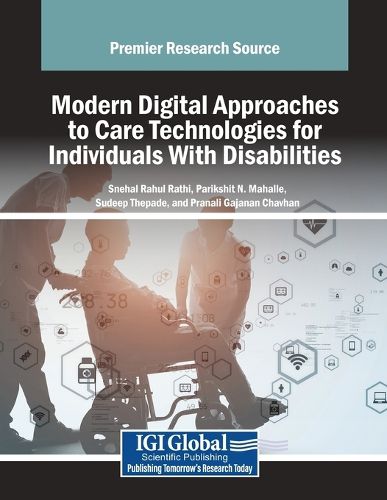Readings Newsletter
Become a Readings Member to make your shopping experience even easier.
Sign in or sign up for free!
You’re not far away from qualifying for FREE standard shipping within Australia
You’ve qualified for FREE standard shipping within Australia
The cart is loading…






This title is printed to order. This book may have been self-published. If so, we cannot guarantee the quality of the content. In the main most books will have gone through the editing process however some may not. We therefore suggest that you be aware of this before ordering this book. If in doubt check either the author or publisher’s details as we are unable to accept any returns unless they are faulty. Please contact us if you have any questions.
The quality of life of individuals with disabilities may be enhanced by integrating cutting-edge solutions that are smart, modern and intelligent. Through the incorporation of digital technologies, the initiative seeks to provide a comprehensive and efficient clinical care system that is customized to fit the specific requirements of people with disabilities by utilizing digital technology. By adopting a contemporary, smart, and digital strategy, this effort has the potential to revolutionize the landscape of clinical disability support. Ultimately, the influence of this effort goes beyond individual empowerment, contributing to a more compassionate and technologically advanced society that appreciates and promotes the capacities of all people. Modern Digital Approaches to Care Technologies for Individuals With Disabilities discusses a sensible, modern and intelligent perspective on leveraging smart and digital technologies for the clinical care of people with impairments. It strives to reduce obstacles and promote inclusion by streamlining clinical care procedures, enhancing communication, and providing targeted support via smart solutions. Covering topics such as drug dispensing, medical emergencies, and maternal care, this book is an excellent resource for physicians, nurses, therapists, care givers, support personnel, policymakers, rehabilitation practitioners, professionals, researchers, scholars, academicians, and more.
$9.00 standard shipping within Australia
FREE standard shipping within Australia for orders over $100.00
Express & International shipping calculated at checkout
This title is printed to order. This book may have been self-published. If so, we cannot guarantee the quality of the content. In the main most books will have gone through the editing process however some may not. We therefore suggest that you be aware of this before ordering this book. If in doubt check either the author or publisher’s details as we are unable to accept any returns unless they are faulty. Please contact us if you have any questions.
The quality of life of individuals with disabilities may be enhanced by integrating cutting-edge solutions that are smart, modern and intelligent. Through the incorporation of digital technologies, the initiative seeks to provide a comprehensive and efficient clinical care system that is customized to fit the specific requirements of people with disabilities by utilizing digital technology. By adopting a contemporary, smart, and digital strategy, this effort has the potential to revolutionize the landscape of clinical disability support. Ultimately, the influence of this effort goes beyond individual empowerment, contributing to a more compassionate and technologically advanced society that appreciates and promotes the capacities of all people. Modern Digital Approaches to Care Technologies for Individuals With Disabilities discusses a sensible, modern and intelligent perspective on leveraging smart and digital technologies for the clinical care of people with impairments. It strives to reduce obstacles and promote inclusion by streamlining clinical care procedures, enhancing communication, and providing targeted support via smart solutions. Covering topics such as drug dispensing, medical emergencies, and maternal care, this book is an excellent resource for physicians, nurses, therapists, care givers, support personnel, policymakers, rehabilitation practitioners, professionals, researchers, scholars, academicians, and more.